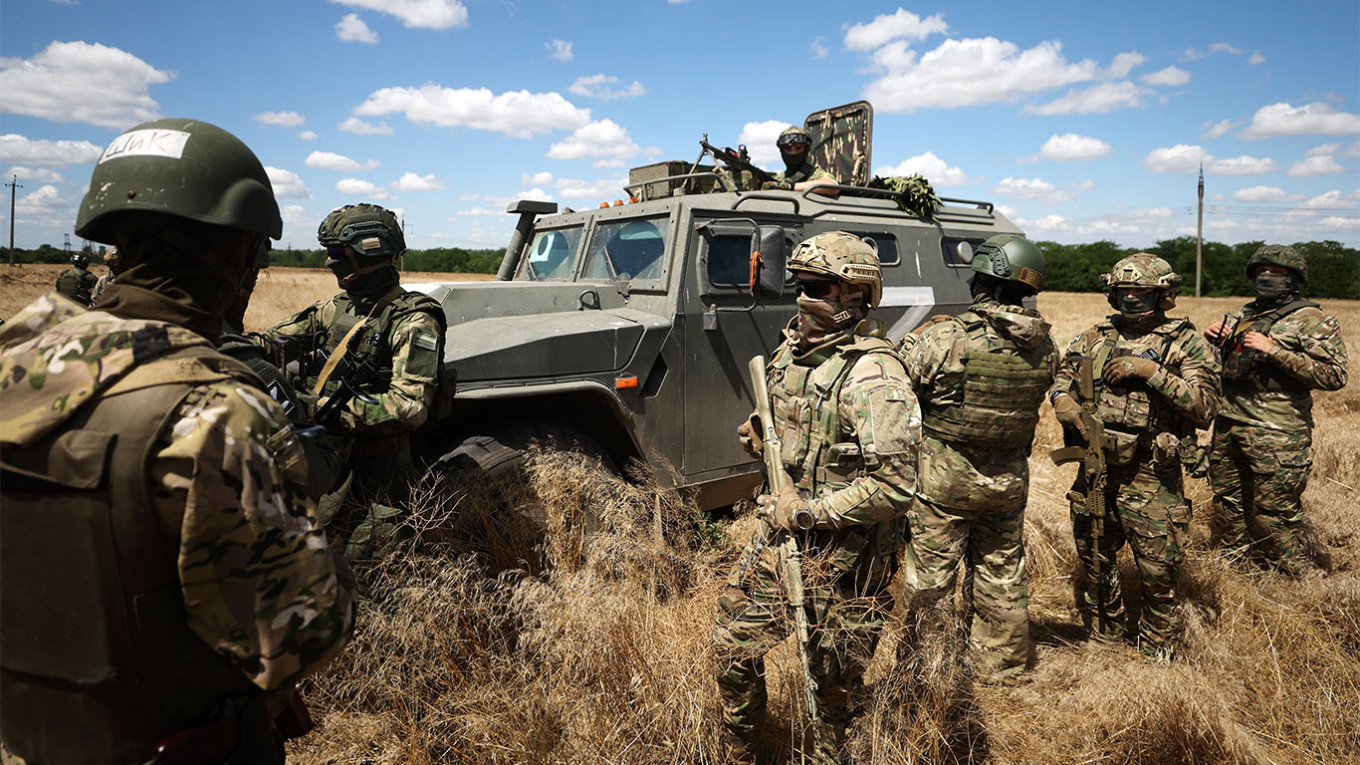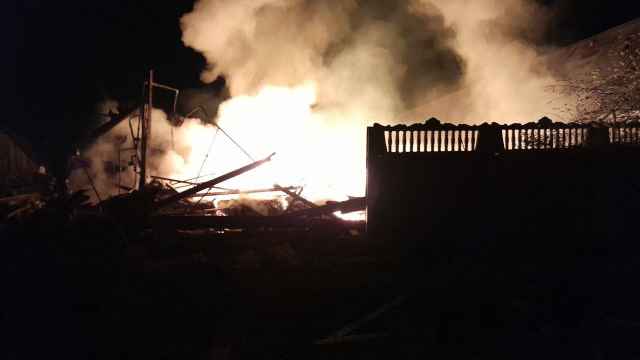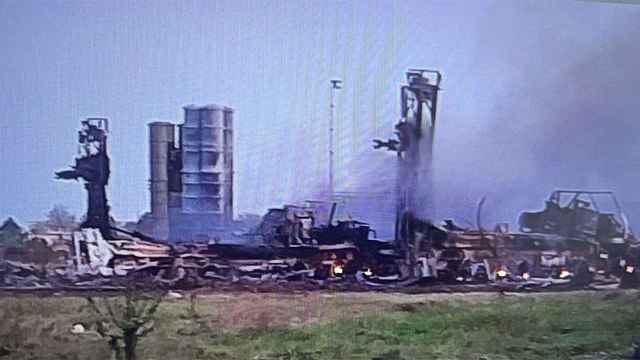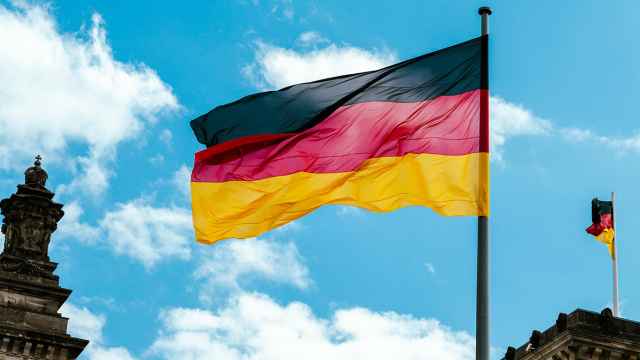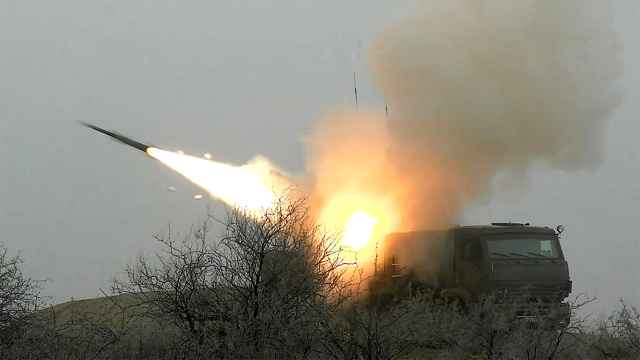A barrage of Ukrainian rocket fire on the Russian-controlled Antonovskiy Bridge in the occupied Kherson region late Tuesday appeared to signal intensifying military preparations for Ukraine’s first major counteroffensive of the war.
Video footage Wednesday showed huge craters in the strategic bridge over the Dnipro River that is part of a major highway connecting the occupied city of Kherson to the Crimean peninsula to the southeast.
The only Ukrainian regional capital captured by Russian forces since its invasion began in February, Kherson has appeared increasingly vulnerable in recent weeks as Ukrainian forces retake nearby towns and villages, gradually creeping closer to the city and setting the stage for what some observers believe will be a major battle.
“I think there’s real concern among the Russians that they may end up with some strategic losses in the south,” said William Alberque, director of the arms control program at the International Institute for Strategic Studies.
"This is a matter of how many forces Ukraine can throw forward.”
Flanked by the Dnipro River to the east and the Inhulets River — a tributary of the Dnipro — to the north, Russian forces in Kherson rely on three major bridges to bring in men, equipment and supplies.
All three have been damaged by Ukrainian strikes in the past two weeks.
The head of the Moscow-installed administration in Kherson region, Kirill Stremousov, said Wednesday that traffic had been halted over the Antonovskiy Bridge.
Photos posted Sunday on Facebook by Kherson region official Yuriy Sobolevsky showed engineers repairing the Nova Kakhovka Bridge east of Kherson, while at least seven holes were blown in the Daryivka Bridge across the Inhulets River in a Ukrainian attack Saturday.
Damage to the bridges restricts Russia’s ability to resupply troops inside Kherson and indicates Ukraine is likely preparing for a major military offensive to try and retake the strategic city, according to analysts.
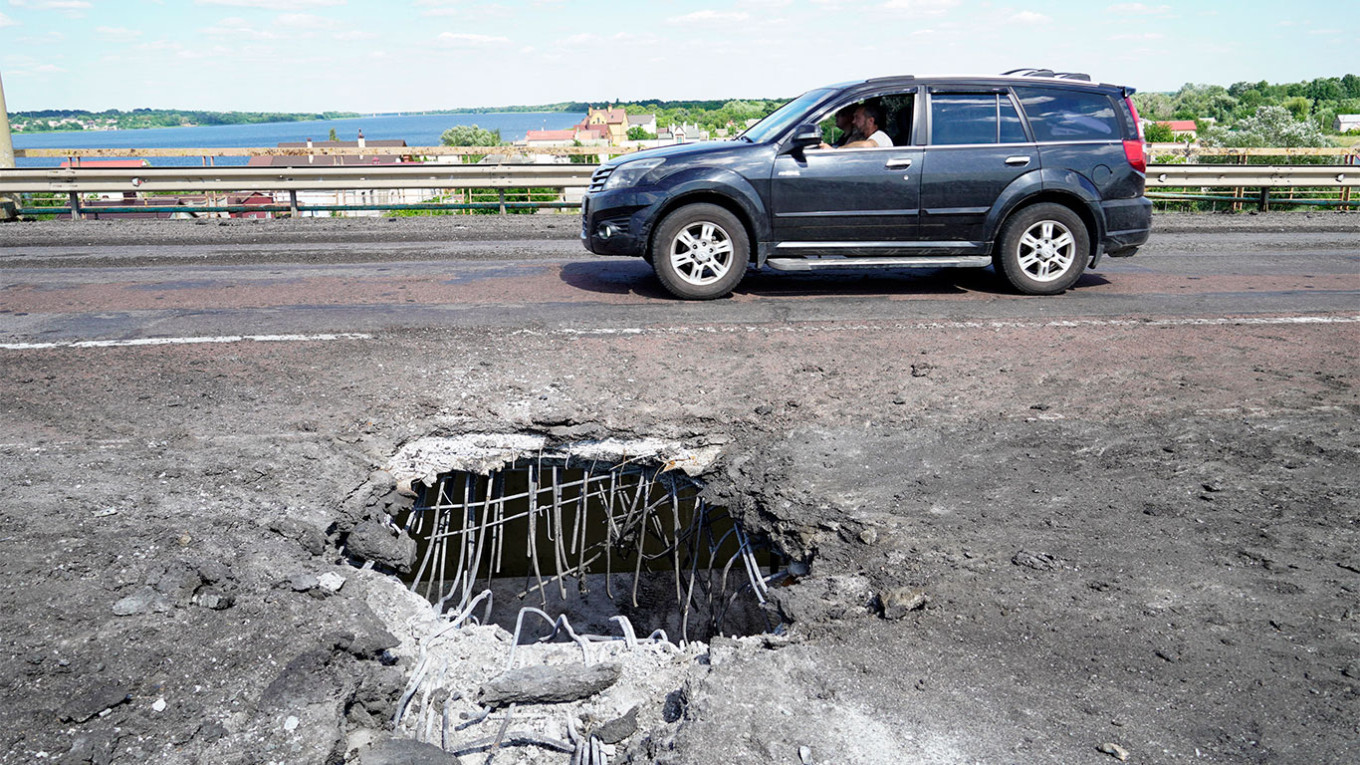
“Every bridge is a weak point for logistics and our armed forces are skilfully destroying the enemy system. This is not yet the liberation of Kherson, but a serious preparatory step in that direction,” said Serhiy Khlan, a former advisor to the Kherson region’s Ukrainian governor, in a Facebook post.
In the four months since Russia seized large swathes of southern Ukraine, the Kremlin has taken steps to draw Kherson and surrounding areas closer into its orbit.
In addition to introducing the Russian ruble, installing Russian mobile networks and offering fast-tracked Russian citizenship, the Moscow-installed administration has set up an election committee to hold a referendum to decide whether Kherson will formally join Russia, state news agency TASS reported last week.
These economic and political measures have been accompanied by a violent crackdown on any sign of pro-Ukrainian feeling or opposition to the Russian occupation.
In a report last week, Human Rights Watch accused Moscow of transforming Kherson into an “abyss of fear and wild lawlessness.”
The effectiveness with which Ukraine has deployed the U.S. weapons has forced Russia to relocate military equipment — particularly artillery systems — further from the frontlines.
“Everything Russia has learned in the early stages about how they need to fight is exactly what is being disrupted right now,” Alberque said.
Footage circulating Tuesday showed Russian tanks and armored personnel carriers reportedly headed in the direction of Kherson from neighboring Mykolaiv — apparent preparations for defense against an expected Ukrainian offensive.
But at the same time, Moscow appears increasingly vulnerable on the battlefield.
In particular, the delivery of U.S. multiple-launch rocket systems — known as HIMARS — appears to have given Ukraine a key military advantage, enabling Kyiv to hit targets deep inside Russian-held territory.
“HIMARS is tearing apart the Russian logistics, ammunition depots and command posts in the Kherson area,” said analyst Alberque.
In footage taken from the Daryivka River bridge damaged by Ukrainian strikes, a Russian pontoon bridge can be seen being constructed nearby.
Whatever the success of the Ukrainian bridge strikes, there has been debate among analysts as to whether Ukraine actually has the military capacity to take back Kherson.
A grueling defense against a sustained Russian offensive in eastern Ukraine took a heavy toll on the Ukrainian army, with President Volodymyr Zelensky estimating last month that up to 100 Ukrainian soldiers were being killed every day.
“Right now, it is difficult to predict what might happen as we do not know how much manpower and equipment either side has,” said Konrad Muzyka, an analyst and head of the Poland-based Rochan consultancy.
“[But] I would say that Ukraine will likely make incremental gains around Kherson.”
Even a modest military success for Ukraine would be a significant morale boost to the country’s embattled armed forces, and deliver a blow to any Russian ambitions of launching another military assault on southern Ukraine.
Ukrainian forces have seized about 44 villages west of Kherson from Russia in the last week, according to Dmytro Butriy, the acting head of the Kherson Regional Military Administration.
“Recapturing Kherson would reinvigorate the Ukrainian army to a massive degree, and help galvanize international support even further,” said analyst Alberque.
A Message from The Moscow Times:
Dear readers,
We are facing unprecedented challenges. Russia's Prosecutor General's Office has designated The Moscow Times as an "undesirable" organization, criminalizing our work and putting our staff at risk of prosecution. This follows our earlier unjust labeling as a "foreign agent."
These actions are direct attempts to silence independent journalism in Russia. The authorities claim our work "discredits the decisions of the Russian leadership." We see things differently: we strive to provide accurate, unbiased reporting on Russia.
We, the journalists of The Moscow Times, refuse to be silenced. But to continue our work, we need your help.
Your support, no matter how small, makes a world of difference. If you can, please support us monthly starting from just $2. It's quick to set up, and every contribution makes a significant impact.
By supporting The Moscow Times, you're defending open, independent journalism in the face of repression. Thank you for standing with us.
Remind me later.



